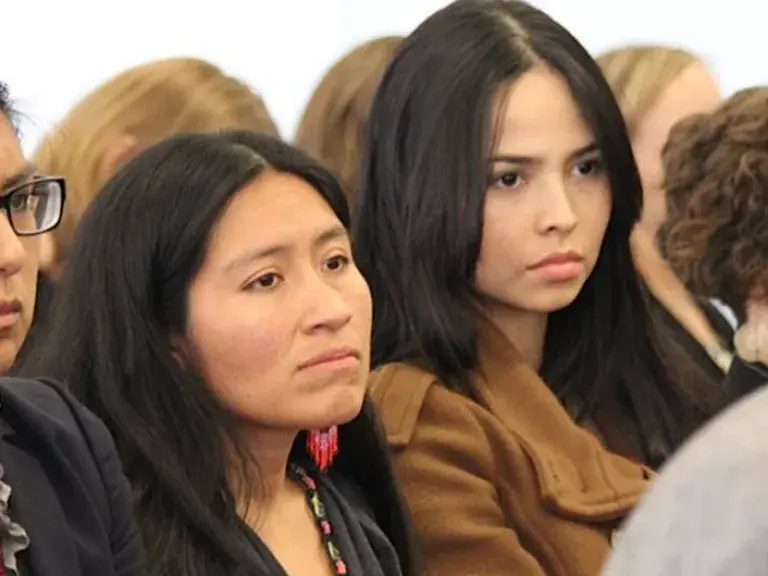
October 15, 2018 | Helena, MT
“It is outrageous that American Indian and Alaska Native women are 2.5 times more likely to be sexually assaulted or raped than other women in the United States and the fact that United States law continues to fail them day after day and decade after decade is the worst type of discrimination.” said Christopher Foley, an attorney at the Indian Law Resource Center. According to the United States Government’s own statistics, more than 4 in 5, or some 84% of American Indian and Alaska Native women have experienced violence in their lifetimes. Even worse, 56% of these indigenous women have experienced sexual violence.
On October 5, 2018, representatives from the Indian Law Resource Center, the Alaska Native Women’s Resource Center, and the National Indigenous Women’s Resource Center attracted global attention to this issue at a hearing before the Inter-American Commission on Human Rights. The Commission is an autonomous body of the Organization of American States, a regional organization consisting of 35 countries, including the United States. The Commission promotes respect for human rights and defends these rights within the Americas. It holds thematic hearings to investigate human rights concerns. Convened while the reauthorization of the Violence Against Women Act, a federal law key to the safety of all women, has been delayed, the hearing highlighted systemic barriers in U.S. law that create an un unworkable, discriminatory criminal jurisdictional scheme and limit the ability of American Indian and Alaska Native nations to protect their women from violence and provide them with meaningful remedies and access to justice. All this creates a cycle of violence allowing criminals to act with impunity in indigenous communities. The hearing is the first on violence against indigenous women in the United States since the adoption of the American Declaration on the Rights of Indigenous Peoples in 2017, a critical affirmation of indigenous peoples and indigenous women’s rights in the Americas. “The rights to personal security and to live free from violence are internationally recognized human rights, yet the staggering, unchecked rates of violence against indigenous women and girls in the United States can only be described as devastating,” said Foley.
“Many indigenous women in the United States disappear, are murdered, or experience domestic violence, sexual assault, and other forms of gender-based violence at alarmingly high rates,” said said Lucy R. Simpson, Executive Director of the National Indigenous Women’s Resource Center. “The murder rate for indigenous women is ten times the national rate on some reservations.” Federal officials have recognized that Native Americans are a vulnerable population to human trafficking yet hard data is scant. “Oil and gas development on and near tribal lands also raises the already high risk that indigenous women will become victims of violence, murder, and sex trafficking,” added Simpson. “The U.S. must not ignore its human rights obligations to respond to, investigate, and address these increasing cases of missing and murdered and sex trafficked indigenous women with due diligence.”
The hearing paid particular attention to the urgent situation of Alaska Native women who are vastly over-represented in the domestic violence victim population and terribly under-served by state law enforcement. “State law enforcement officers serve less than 100 of Alaska’s more than 200 rural villages, leaving many villages without any law enforcement presence at all,” stated Tamra (Tami) Truett Jerue, Executive Director of the Alaska Native Women’s Resource Center. “The jurisdictional restrictions in VAWA 2013 that deny Alaska Natives the full benefit of the law and treat Alaska Native women differently than other women are some of the most dangerous barriers in U.S. law today.”
Carlos Trujillo, U.S. Ambassador to the Organization of American States, recited programs and policies being carried out by the United States government to protect women, including indigenous women.
While acknowledging the United States’ efforts, Commissioner Joel Hernandez Garcia said he was struck by the high level of violence against Alaska Native women, describing it as “really astonishing.”
Commission President Margarette May Macaulay concluded the hearing by assuring the petitioning organizations that the Commission would “continue to monitor the situation” and assist in any way. She also requested more information to enhance their reporting. The indigenous petitioning organizations urged the Commission to issue strong recommendations to the United States with respect to its obligations to indigenous women under international human rights law, including but not limited to restoring the criminal authority of American Indian and Alaska Native nations to prosecute non-Indians committing crimes in Indian country and Alaska Native villages; reauthorizing and strengthening the Violence Against Women Act and the Tribal Law and Order Act with measures aimed at ensuring that American Indian and Alaska Native nations have the authority and resources they need to provide safety, justice, and healing for victims of gender-based violence; creating a permanent mandate within the Victim of Crimes Act, the largest source of federal funding for crime victims in the United States, to distribute funds directly to Indian nations to ensure that indigenous women have access to victim services and compensation; launching immediate reforms to ensure that the federal response to missing and murdered indigenous women is appropriate, swift, and just; increasing federal technical and financial support to Indian nations to enhance their response to violence against indigenous women; providing sufficient federal support to non-profit, non-governmental indigenous women’s organizations to provide effective and culturally appropriate services to indigenous women survivors; creating a forum for dialogue, collaboration, and cooperation among tribal courts, federal courts, and state courts on the issue of violence against indigenous women on tribal and Alaska Native lands; developing a national initiative in consultation with Indian nations to examine and implement reforms to increase the safety of Native women living within tribal lands under concurrent tribal-state jurisdictional authority (Public Law 280 states); and supporting the recommendations of the Indian Law and Order Commission, chapter 2 on Alaska, particularly for a legislative fix for the U.S. Supreme Court’s decision in Venetie v. State of Alaska regarding Indian country.
On-demand viewing of the hearing is available on the IACHR YouTube at https://www.youtube.com/watch?v=6NYS32e9agc.
###
About the Petitioning Organizations
Organized in 2015, the Alaska Native Women’s Resource Center (AKNWRC) is a tribal nonprofit organization dedicated to ending violence against women with Alaska’s 229 tribes and allied organizations. AKNWRC board members are Alaska Native women raised in Alaska Native Villages and have 141 years of combined experience in tribal governments, nonprofit management, domestic violence, and sexual assault advocacy (both individual crisis and systems and grassroots social change advocacy at the local, statewide, regional, national and international levels), and other social service experience. AKNWRC’s philosophy is that violence against women is rooted in the colonization of indigenous nations.
Founded in 1978 by American Indians, the Indian Law Resource Center (ILRC) is a non-profit organization providing legal assistance to indigenous peoples of the Americas to combat racism and oppression, to protect their lands and environment, to protect their cultures, to achieve sustainable economic development and genuine self-government, and to realize their other human rights. Its Safe Women, Strong Nation’s project works with indigenous women’s organizations and Native nations to end violence against indigenous women. ILRC is in consultative status with the UN Economic and Social Council. (www.indianlaw.org).
The National Congress of American Indians (NCAI) is the oldest and largest national organization of American Indian and Alaska Native tribal governments, and is committed to ending the epidemic of violence against American Indian and Alaska Native women. In 2003, NCAI created the NCAI Task Force on Violence Against Women to address and coordinate an organized response regarding violence against American Indian and Alaska Native women. NCAI is in consultative status with the UN Economic and Social Council. (www.ncai.org).
The National Indigenous Women's Resource Center, Inc. (NIWRC) is a nonprofit organization whose mission is to ensure the safety of Native women by protecting and preserving the inherent sovereign authority of American Indian and Alaska Native nations to respond to domestic violence and sexual assault. NIWRC’s Board consists of Native women leaders from American Indian and Alaska Native nations across the United States. NIWRC is a national resource center for Indian nations providing technical assistance, policy development, training, materials, resource information, and the development of tribal strategies and responses to end the violence. In 2015, NIWRC launched the Violence Against Women Act (VAWA) Sovereignty Initiative to defend the constitutionality and functionality of all VAWA tribal provisions. (www.niwrc.org).
Downloads:
Recommendations
Statements
>> Christopher T. Foley, Attorney with the Indian Law Resource Center
>> Lucy R. Simpson, Executive Director of the National Indigenous Women's Resource Center
>> Tami Truett Jerue, Executive Director of the Alaska Native Women's Resource Center
Briefing Paper (October, 2018)
Photos
Supplemental Briefing Paper (February, 2019)
Annex to IACHR Press Release on Hearing (Allegations of Killings, Disappearances, and Multiple Forms of Discrimination Against Indigenous Communities and Indigenous Women in Alaska, United States)
